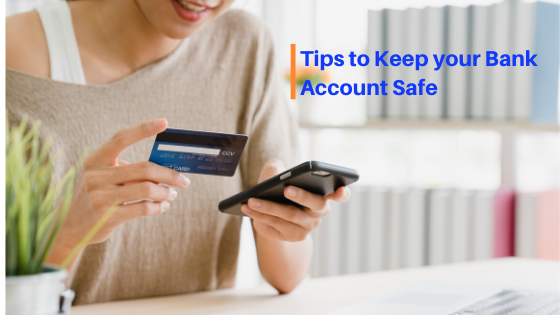Are you too worried about how to keep the bank account safe? In this article, we are sharing with you all such information on how to keep your bank account safe in Nepal.
It is the 21st century. Banking has never been easier. Earlier, we had to travel to a local bank branch to carry out every banking transaction like depositing and withdrawing money. Now, with the emergence of mobile and internet banking, we can do almost every transaction anytime and from anywhere using our smartphone. Along with this simplicity in banking, we are also regularly hearing the news of bank accounts being hacked and money being stolen from the accounts. With the emergence of digital banking technology, there is fear among banking customers that financial details could be at risk if their phones are lost or stolen. Safety and security are the most crucial aspect of the banking sector. Many of us might not be aware of banking safety.
How to keep your Debit and Credit Card safe?
A Debit Card is a payment card, which enables you with the option of making purchases at merchant locations as well as cash withdrawal from ATMs with access to your bank account. It is a convenient financial management tool. Similarly, Credit Card is a safe, secure and convenient financial management tool that offers many benefits.
These cards offer many benefits. At the same time, it is important to remember that owning a debit or credit card carries many responsibilities.
Follow these easy tips to keep your Debit and Credit Card transactions safe:
1. Keep your PINs to yourself only
Your Debit/Credit Card PINs are the keys to everything you have in your bank accounts. Never give them to anyone. Similarly, replace your temporary pins immediately when you get a new card. Also, please don’t use passwords that may be easily identified such as your birthday, or a common number pattern eg. 1234. Try to memorize the PIN instead of noting it down somewhere.
2. Don’t lend your card to anyone
Never lend your card or reveal the card number to anyone, except to the merchant you are transacting with. And make sure the card returned to you at the merchant establishment is yours.
3. Always check your billing statement
You should always check the purchases and compare them with the bills and receipts in your possession. Always keep a copy of the bill and the payment slip (and ATM receipts too) for all transactions.
4. Enable Two-Factor Authentication for internet payments
After you activate two-factor authentication, every time you log in to your account or try to make online transactions using the card, you will receive an SMS with a one-time password (OTP). It is a very essential feature.
If a hacker tries to log into your account, you will get an SMS with a code. Once you realize that you didn’t make this request, you can stop the hacker immediately.
Never send an OTP if someone requests you to do so.
5. Enable SMS/email alerts
Banks these days have implemented a very useful security feature: to notify you immediately about transactions from your account through SMS and email. Contact your bank and activate them so you can track your spending as you swipe your card, withdraw money from an ATM, load fund in digital wallets like Khalti, or make online payments. Notify the bank immediately if you suspect any fraudulent transactions in your account.
6. Check your bank statements regularly
It is advised to check your bank accounts at least once a week so as to ensure there have not been unauthorized transactions in your account.
7. For security reasons, please keep a photocopy of the front and backside of the card with you.
8. In case of lost or stolen, please inform the bank immediately to block further usage and request for a replacement card.
How to keep your bank account safe while using Internet Banking and Mobile Banking?
Internet banking and mobile banking are electronic payment systems that enable you to conduct a range of financial transactions through the bank’s website or mobile app. Using eBanking/mobile banking, you can obtain your account balances, a list of recent transactions, various utility bill payments, and funds transfers between bank accounts. You can access all these facilities anytime and from anywhere using a mobile or computer. It’s less time-consuming and convenient.
Follow these simple tips to keep your internet banking and mobile banking transactions safe:
1. Keep your passwords and PINs secret
First and foremost, don’t reveal your passwords/PINs to anyone else, even your family members. Do not reveal them to anyone, not even to a bank employee. Banks never request customers to provide their passwords. Banks never send links in email for any reason.
If you sense your online Password has been compromised, change it immediately.
2. Avoid easy-to-guess PINs
One of our major weaknesses in online banking is we set weak and easy-to-guess passwords like password, 123456, 111111, 123123 abc123, admin, etc. We should set a strong and complex password.
3. Log in to your account from your personal devices only
Avoid logging into your internet banking / mobile banking account from a cybercafe or a shared computer.
Don’t walk away from your computer if you are in the middle of a session. After completing your banking transactions, always log off before visiting other Internet sites. If anyone else is likely to use your computer, please clear the cache memory. This function is generally found in your settings menu.
4. Don’t open suspicious (phishing) emails
You might get some emails that ask for your personal information. These are called phishing emails. These emails try to trick you into sharing your internet/mobile banking passwords and credit card information. The emails may look like they come from the bank, but the person on the other end of that message is almost always a hacker.
Never answer an email that asks to change your password/PIN/security code, even if it looks like it’s from your bank. Banks never send such emails.
Don’t open any links or attachments in the email. Don’t reply to such emails or dial the numbers in the email.
Just remember that your bank will never ask you for your login details, financial information or personal information through email or text message. If you receive such emails, make sure you report them to the bank immediately.
5. Always type the correct Internet URL in your browser window
To access Internet Banking, always type in the correct URL into your browser window. Never click a link that offers to take you to the bank’s website.
6. Don’t use automatic login
Your browser saves your username and password when you enable automatic login or choose the ‘save passwords’ option. Though automatic login is convenient, it might not be safe. You should avoid automatic login while you use your phone for online banking.
What would happen if someone gets access to your phone? They will not even need your username or password to get into your bank account. So, please disable this feature on your phone and on your desktop, now.
7. Secure your smartphone and laptop with a password and other security features
You should enable your smartphone’s security measures like pin, password, pattern, facial recognition, or a fingerprint. Likewise, you should use a password/pin lock on laptops. If your phone or laptop gets lost or stolen, the culprit won’t be able to log in to your devices easily.
Note: Contact your bank immediately:
If you are unable to log in to your internet banking / mobile banking account.
If you notice any suspicious activities on your account.
Read also: How to open a bank account in Nepal and enable mobile and internet banking?



